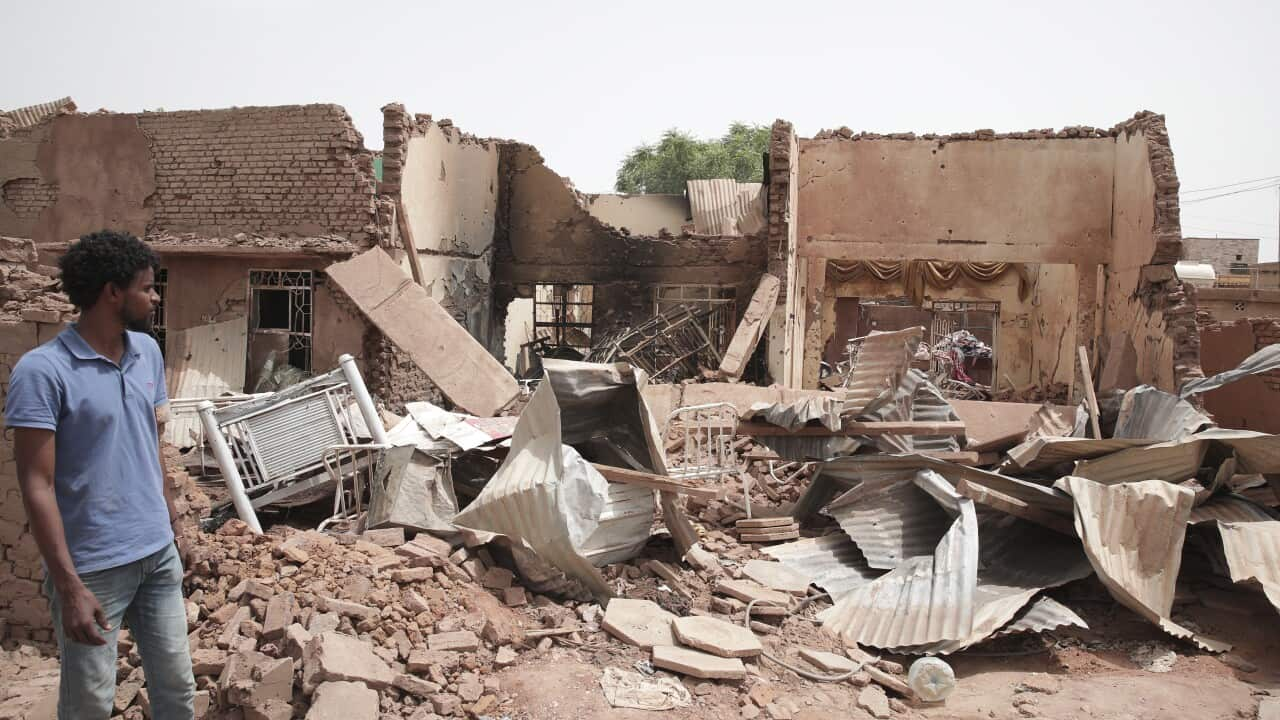Key Points
- Nearly 70 Australians have been evacuated from Sudan as the conflict between army and paramilitary group continues.
- The more than 100 Australians still in Sudan have been told to "consider leaving as soon as possible".
- More than 500 people have died in the conflict since fighting broke out earlier in April.
Nearly 70 Australians have safely left Sudan as a bloody conflict continues between the army and a paramilitary group.
Just under 160 Australians were known to be in Sudan at the start of the week.
On Thursday, the prime minister said officials were working to provide assistance to more than 100 Australians still in Sudan.
Assistant Foreign Affairs Minister Tim Watts met with representatives from Australia's Sudanese community to discuss efforts to facilitate the evacuation of Australian citizens and their families.
Australia does not have an embassy in Sudan, with the closest being Egypt.

A growing list of countries have evacuated diplomats and citizens from Sudan's capital, Khartoum. Source: AAP / ANP/Sipa USA
Flights from partner countries are leaving from the Wadi Sayyidna airfield and boats are departing from Port Sudan to Jeddah.
"Australians in Sudan wishing to depart should strongly consider leaving as soon as possible," Mr Watts said, acknowledging the 72-hour ceasefire ends on Thursday night and further departure cannot be guaranteed.
Sudanese people in Australia can apply for visa extensions and those who have a "no further stay" condition can apply to have it waived.
"I know many in the Sudanese community are deeply concerned at the deteriorating humanitarian situation in Sudan," Mr Watts said.
"The Australian government condemns the violence across Sudan that has resulted in the deaths of hundreds of innocent people."
On Wednesday, Australian man Eltayeb Eltayeb told SBS News he and his family were so desperate to escape that they had made the decision to risk their lives and drive to an airbase north of the capital, Khartoum.

Eltayeb Eltayeb and his family were evacuated from Sudan by the British airforce. Source: Supplied / Eltayeb Eltayeb
The Australian and his family were among the few foreign passport holders allowed to fill extra seats on the flight, after priority was given to United Kingdom and Canadian citizens.
While Mr Eltayeb was relieved to get out of the conflict zone, he was disappointed he had to rely on the charity of other nations after getting no help from the Australian government.
"Very appalling, very disappointing, utterly disgusting that this is how your government is treating you," he told SBS News.
"I called the consulate so many times — the Australian embassy — and I told them this is not the last time they will be hearing from me or hearing from the citizens stuck in Sudan, while you guys did not try to help them at all."
Fighting between Sudan's army and the paramilitary group the Rapid Support Forces has led to widespread unrest in the African nation.
The fighting has triggered a rush to safely evacuate foreign diplomats and citizens from Sudan, with a 72-hour ceasefire being called.
Prime Minister Anthony Albanese said Australia was continuing to provide support to citizens who were in Sudan and urged for the conflict to stop.
Mr Albanese said the situation in Sudan was a "dangerous circumstance".
"We would call upon all sides of the conflict in Sudan to refrain from the violence that is occurring," he told reporters in Brisbane on Thursday.
"We're also working with our allies, including the United Kingdom, to make sure that our people in Sudan are looked after; we'll continue to do that."
Despite a ceasefire being ordered, battles have been reported on the outskirts of the Sudanese capital Khartoum.
Several countries have evacuated officials and citizens by air while others have used ports on the Red Sea
More than 500 people have died in the conflict since fighting broke out earlier in April, while thousands have been wounded.
Australians in Sudan can register via the .










